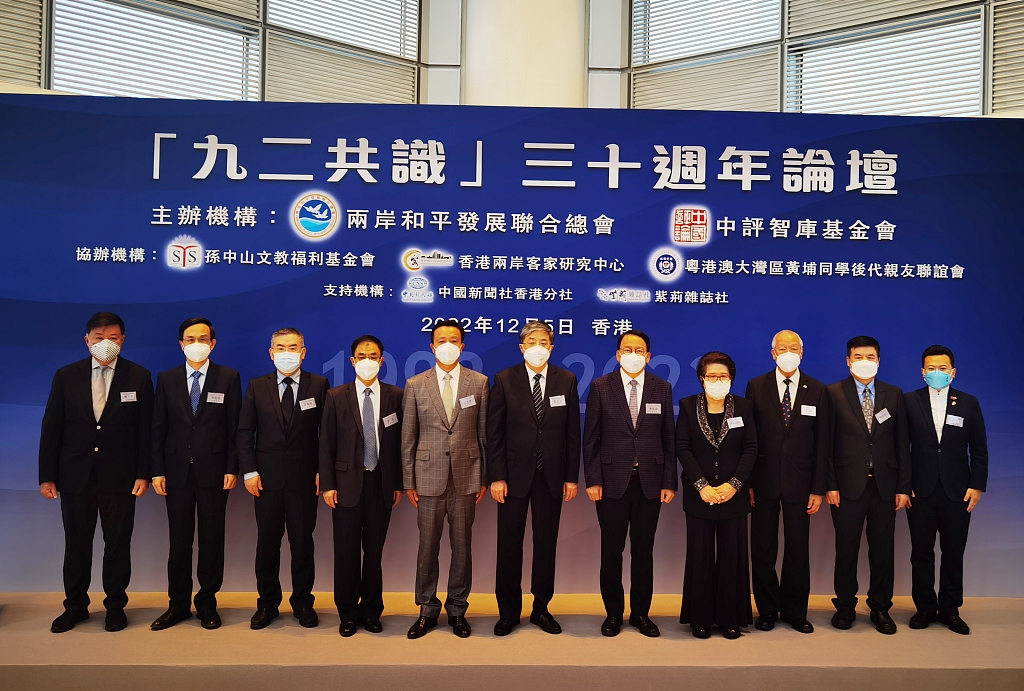A forum held in China's Hong Kong Special Administrative Region (HKSAR) to mark the 30th anniversary of the 1992 Consensus stressed the one-China principle and opposed "Taiwan independence."
The 1992 Consensus refers to the consensus reached in 1992 by the mainland-based Association for Relations Across the Taiwan Straits (ARATS) and the Taiwan-based Straits Exchange Foundation.
After talks in Hong Kong in October that year and a series of subsequent correspondence and telephone exchanges, they agreed to state that "the two sides of the Taiwan Straits both stick to the one-China principle." The essence of the 1992 Consensus is that "both sides of the Taiwan Straits belong to one China and will work together toward national reunification."
ARATS President Zhang Zhijun told the forum via video that the past 30 years have fully proved that when the 1992 Consensus and the one-China principle are upheld, cross-Strait relations will improve and develop, and compatriots in Taiwan will benefit from it, whereas denying the 1992 Consensus and deviating from the one-China principle lead to strained and volatile cross-Strait relations and undermine the interests of compatriots in Taiwan.
The 1992 Consensus remains the anchor for improving and developing relations across the Taiwan Straits, no matter how cross-Strait ties change over time, he said.

A forum marking the 30th anniversary of the 1992 Consensus is held in Hong Kong, China, December 5, 2022. /CFP
A forum marking the 30th anniversary of the 1992 Consensus is held in Hong Kong, China, December 5, 2022. /CFP
Luo Yonggang, deputy director of the Liaison Office of the Central People's Government in the HKSAR, said Hong Kong, as an important witness to the achievement of the 1992 Consensus, has always played an important role in the peaceful development of cross-Strait relations.
As members of the big family of the Chinese nation, Hong Kong compatriots have the responsibility and obligation to firmly support the one-China principle and the 1992 Consensus, continue to promote exchanges and cooperation between Hong Kong and Taiwan in various fields, narrate a story of Hong Kong's successful practice of "One Country, Two Systems," and jointly advance national reunification, he said.
Hung Hsiu-chu, former chairperson of the Chinese Kuomintang party, said in a video address that the 1992 Consensus very clearly defines the fundamental nature of cross-Strait relations, that is, the mainland and Taiwan belong to one China.
She noted that thanks to the 1992 Consensus, the two sides have been able to temporarily put aside their differences, open the door to exchanges and dialogue, and jointly build a vision of mutual benefit and common prosperity, adding that she hopes that both sides of the Taiwan Straits will continue to adhere to the 1992 Consensus and create a more favorable environment and conditions for peaceful reunification.
Chan Kwok-ki, chief secretary for the administration of the HKSAR government, noted that "One Country, Two Systems" was first proposed by the central government to solve the Taiwan question, but it was first put into practice in Hong Kong.
It has been proved that "One Country, Two Systems" is the best institutional arrangement for maintaining long-term prosperity and stability of Hong Kong since its return to the motherland, he said, adding that Hong Kong compatriots will, as always, make contributions to the peaceful development of cross-Strait relations and China's peaceful reunification.
The forum was co-organized on Monday by the Cross-Strait Peaceful Development Federation and the China Review Think Tank Foundation.
Source(s): Xinhua News Agency